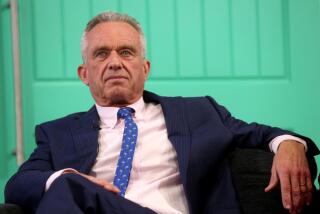Lionel Steinberg; Grower Signed 1st Pact With Chavez’s Union
- Share via
Lionel Steinberg, the first table grape grower to sign the historic initial contract with Cesar Chavez and his United Farm Workers in 1970, has died. He was 79.
Steinberg died Sunday in Palm Springs, said his son, grower and songwriter Billy Steinberg.
A major grower in the Coachella Valley, the elder Steinberg was the longtime president of David Freedman & Co., based in Thermal. He also served for many years on the California Board of Agriculture, under both Gov. Edmund G. “Pat” Brown Sr. and his son, Gov. Edmund G. “Jerry” Brown Jr., and was named board president in 1975.
In the turbulent late 1960s, amid grape boycotts and marches for better farm wages and living conditions, Steinberg stood virtually alone among growers in his willingness to negotiate with Chavez and his ragtag union.
Steinberg dramatically resigned from the California Grape and Tree Fruit League in protest of figures that he said the league had falsified to belittle the effectiveness of the union’s strike and boycott of the table grape industry.
“We cannot continue to try to sweep this problem under the rug,” he told his fellow growers in the summer of 1969. He said the labor action had turned the Coachella Valley into “a disaster area” and predicted that if it continued, “one-half of the remaining 85 grape growers will not be in business next year.”
Steinberg tried to negotiate an individual contract with the union for his vast Freedman farms, enlisting the aid of Sen. Edward M. Kennedy (D-Mass.) and the Federal Mediation Service. When that failed, Steinberg formed a group of a dozen growers willing to negotiate.
On April 10, 1970, Steinberg made history when he signed the first contract with Chavez.
“I had a high regard for Cesar--he was an honest man,” Steinberg told The Times in 1993.
Yet Steinberg never hesitated to criticize his adversary either, recalling in that same interview: “He was running the union with priests and nuns and Ivy Leaguers on sabbatical. It was more like a political crusade than a trade union effort.”
Although pragmatic enough to deal with the union when others refused, Steinberg complained for years that his labor costs were higher than those of his nonunion competitors and that contractual grievance procedures hurt productivity.
During his tenure on the state Board of Agriculture, Steinberg led two “People-to-People” delegations of California farmers to Europe and the Soviet Union and a third to Chile. He wrote regular reports for The Times on their observations during those early 1960s tours--including their disappointment over meeting more officials than farmers in Russia.
Steinberg was a lifelong leader in California’s Democratic Party. In his youth he was president of the California Federation of Young Democratic Clubs. Later he was a major supporter of both the Brown and Kennedy political dynasties. Steinberg also led efforts to help Adlai Stevenson become the Democratic presidential nominee in 1952.
In addition to his son Billy, who lives in Brentwood, Steinberg is survived by his wife, Katrina, and two daughters, Barbara of Hawaii and Mary Steinberg Pichet of Connecticut.
More to Read
Sign up for Essential California
The most important California stories and recommendations in your inbox every morning.
You may occasionally receive promotional content from the Los Angeles Times.










